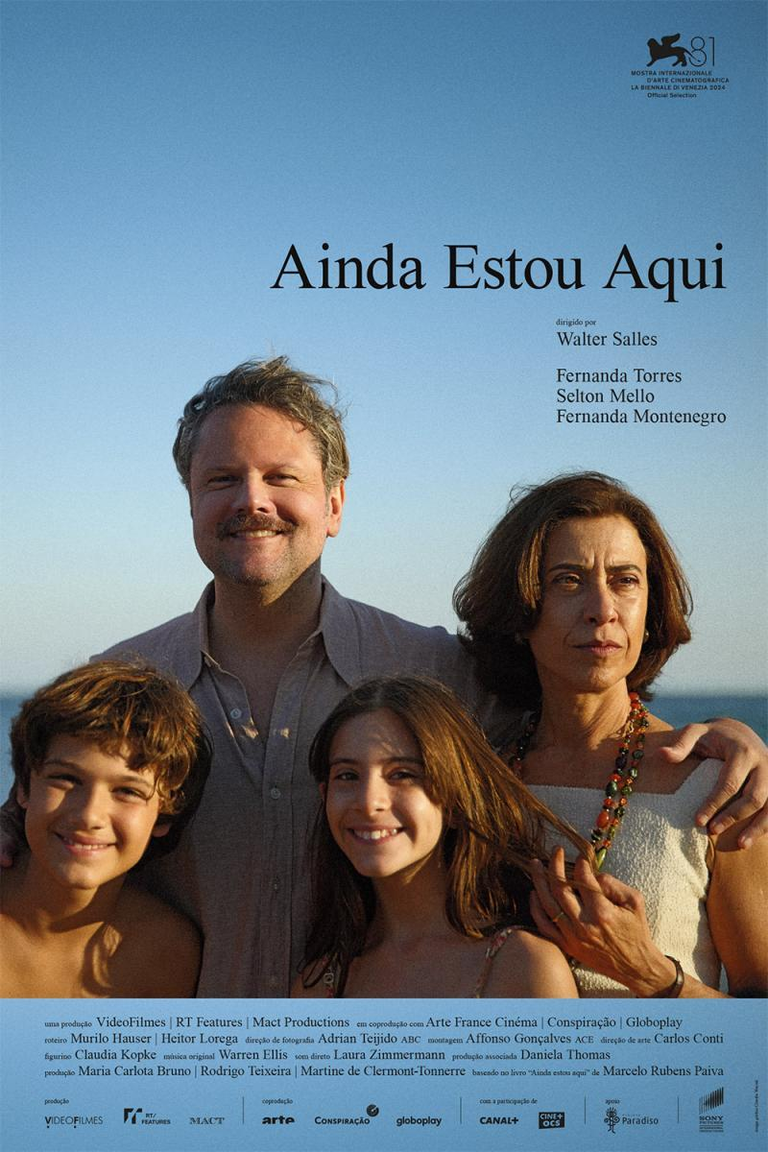"Aún estoy aquí" de Walter Salles, o la historia del terror repetido
Pude ver, por esas opciones de streaming, el filme Aún estoy aquí (“Ainda estou aqui”) del cineasta brasileño Walter Salles, autor de un filme inolvidable: “Estación central”, de 1998, entre otros. Este filme de Walter Salles me conmovió, y sobre él quisiera dar mi modesta apreciación.

Quizás muchos usuarios de #Hive desconocerán los dramas y tragedias que hemos vivido (sufrido) los latinoamericanos. Difícilmente puedan compartirse, en el sentido más grato del verbo, situaciones y actos de violación de los DDHH, como han ocurrido, particularmente, en los últimos meses en mi país (Venezuela). Lamentablemente, la historia parece repetirse; dijo Marx que primero como tragedia y luego como farsa. Pero, como plantea Slavoj Zizek, la farsa puede ser, incluso, más terrorífica que la tragedia original.
¿Cuántas veces en nuestros países, nuestra gente, en particular, intelectuales y políticos han sido víctimas de las más atroces injusticias, siendo perseguidos, encarcelados e, incluso, asesinados, con la mayor impunidad y descaro?
De esa realidad trata Aún estoy aquí.
El filme de Salles, basado en una historia real, durante la dictadura militar brasileña de los años 70 (y más), nos presenta la dura realidad vivida por una familia, en especial, por la esposa del intelectual y diputado apresado arbitrariamente, de quien no conoce su paradero ni estado de salud. De él solo sabrá, más tarde, que está muerto, por supuesto, asesinado por los gendarmes de la dictadura (¡cualquiera coincidencia con la realidad venezolana es pura ficción!).
Gracias a la avezada experiencia de Walter Salles como cineasta, y un magnífico guion, basado en el libro de Marcelo Rubens Paiva, hijo de la víctima, experimentamos como espectadores el drama-tragedia de una familia atormentada ante la desaparición forzada de su padre.
Con inteligencia, la historia del filme (no conozco el libro que le da pie) se centra en la esposa (más tarde, viuda) y madre de cuatro hijos, que se ve, no sólo ante la crisis emocional de no conocer del destino de su marido (aunque algo supone), además de haber sido sometida a un trato carcelario, aunque pasajero, duro, sino también enfrentar las necesidades y demandas de su familia.
La actuación de Fernanda Torres es quizás el factor que más merece ser resaltado entre sus logros; la actriz alcanza una heterogénea expresividad, entre el máximo dolor y la desesperación, y la sobriedad y el afecto hacia sus hijos. Cabe destacar una sensible fotografía, eficiente edición —con suso del flashback— y una apreciada música.
Filmes como este, que den cuenta las terribles historias de nuestros países, muchas veces desconocidas por el resto del mundo, son cada vez más necesarios.
Referencias:
https://es.wikipedia.org/wiki/Walter_Salles
https://www.filmaffinity.com/es/film121387.html




![Click here to read in english]
Walter Salles or the History of Repeated Terror
Through these streaming options, I was able to watch the film I'm Still Here(“Ainda estou aqui”) by Brazilian filmmaker Walter Salles (https://es.wikipedia.org/wiki/Walter_Salles), who made an unforgettable film, “Estación central,” from 1998, among others. This film by Walter Salles moved me, and I would like to offer my modest opinion of it.
Perhaps many #Hive users are unaware of the dramas and tragedies we Latin Americans have experienced (suffered), especially in recent decades. It is difficult to share, in the most pleasant sense of the word, situations and acts of human rights violations, as has happened, particularly in recent months in my country (Venezuela). Sadly, history seems to repeat itself; as Marx said, first as tragedy, then as farce. But, as Slavoj Zizek argues, the farce can be even more terrifying than the original tragedy.How many times have our countries, our people, and particularly intellectuals and politicians been victims of the most atrocious injustices, being persecuted, imprisoned, and even murdered, with the utmost impunity and shamelessness?
This is the reality that I'm Still Here deals with.
Salles' film, based on a true story during the Brazilian military dictatorship of the 1970s (and beyond), presents the harsh reality experienced by a family, especially by the wife of the intellectual and congressman who was arbitrarily imprisoned, whose whereabouts and state of health are unknown. She only learns later, through informal channels, that he is dead, of course, murdered by the dictatorship's gendarmes (any coincidence with Venezuelan reality is pure fiction!).
Thanks to Walter Salles's seasoned experience as a filmmaker and a magnificent script, based on the book by Marcelo Rubens Paiva, the victim's son, we as viewers experience the drama-tragedy of a family tormented by the forced disappearance of their father.
The film's story (I don't know the book that inspired it) intelligently focuses on the wife (later widowed) and mother of four children, who finds herself not only facing the emotional crisis of not knowing her husband's fate (although she assumes something), but also having been subjected to harsh, albeit temporary, prison treatment and facing the demands of her family.
Fernanda Torres' performance is perhaps the factor that most deserves to be highlighted among its achievements. Also noteworthy is the sensitive cinematography and the esteemed music.
Films like this, which tell the terrible stories of our countries, often unknown to the rest of the world, are increasingly necessary.
Se oye interesante ese filme. me gustaria verlo.
Sí, es muy interesante. Puedes verlo por una de esas plataformas; yo lo conseguí en Magis. Saludos, @neblomax.
@commentrewarder
Acknowledges the emotional weight of both the film and the historical context
That's what I tried to do. Thank you, @siva1993.
@commentrewarder
@josemalavem, I paid out 0.079 HIVE and 0.015 HBD to reward 2 comments in this discussion thread.